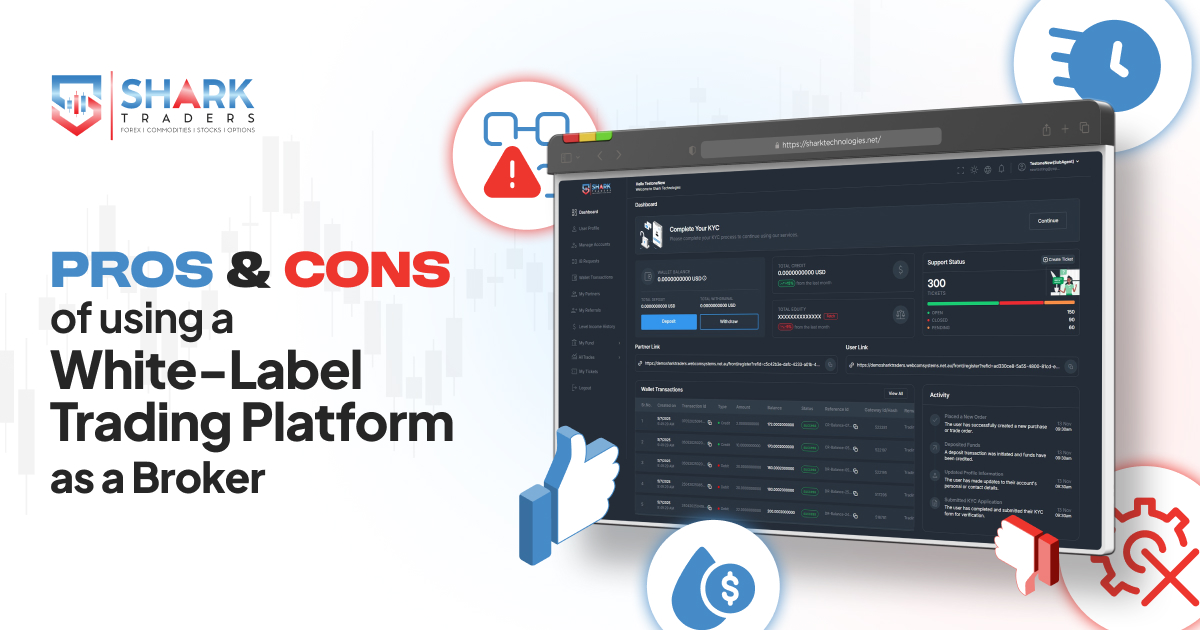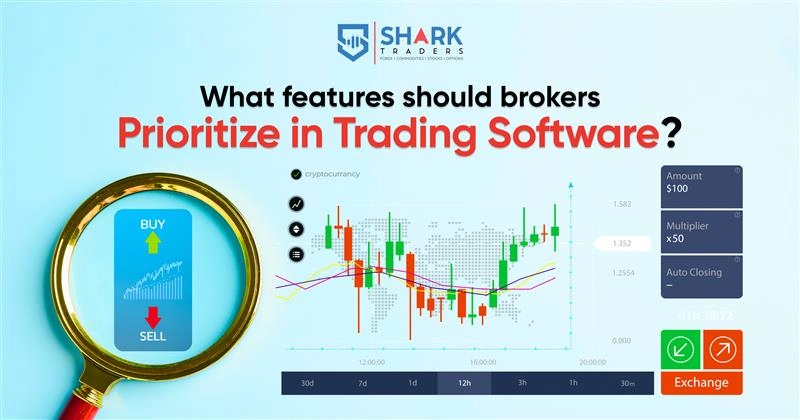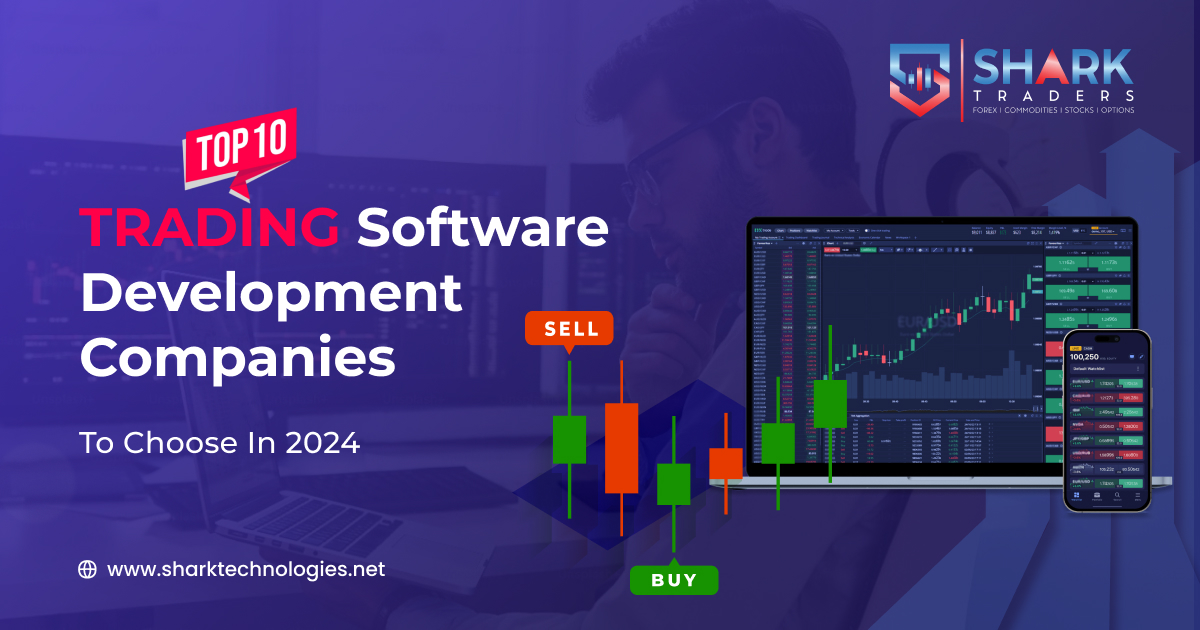The trading market is brimming with highly lucrative opportunities. Yet, traders and investors struggle to find brokerages that can equip them with sturdy platforms for spotting and trading these opportunities.
Thus, this lack makes starting a brokerage a promising business venture. However, it requires extensive research, time, financial investment, skilled developers, and a solid technological infrastructure to serve clients with a powerful trading platform.
That’s why opting for white label trading software presents a good option. But here the question is, is it a wise one? Let’s find out!
Understanding White-label Trading Platform for Brokers
“White-label software” refers to a pre-developed software solution that is functional but lacks branding. The term “white label” indicates the absence of a specific brand.
A white-label trading platform is a pre-developed trading software that does not have its own branding or customization. Brokerages can personalize the platform by adding their own logos, colors, themes, and more. Additionally, features such as trading instruments, charting tools, asset sets, and payment integrations can be customized to offer the trading services.
Features Of A White-Label Trading Software
Here are the main features of white-label trading software that make it useful for both brokerages and their clients:
- Branding/Customization: It provides various options for defining the look/feel, colors/logos, and other branding elements.
- Liquidity Integration: The software connects with deep liquidity pools across different asset classes from Tier-1 liquidity providers.
- Multi-Asset: Support for popular trading instruments enables the platform to provide trading services across multiple asset markets, including forex, stocks, cryptocurrency, and others.
- Trading Engine: Software is coded with functionalities like order placement, order execution, account funding, fetching withdrawals, etc.
- Real-time Market/Pricing Data: It provides real-time market prices and economic indicators.
- Regulatory Components: A white-label platform meets local and international regulations (KYC/AML, risk management, regulatory standards, reporting, audits).
- Security Infrastructure—In addition to compliance, it includes security protocols such as data encryption, two-factor authentication, and regular audits.
- Mobile Trading Apps (iOS & Android) – It supports both desktop and mobile accessibility through iOS smartphones and tablets.
- 24/7 Support and Updates—It features continuous technical support as well as regular updates to keep you up-to-date.
Benefits And Drawbacks Of A White-Label Trading Platform For Brokers
A white-label software has numerous benefits over building trading software from scratch. That’s why most brokerages worldwide prefer pre-developed software instead of investing so much in in-house development. Yet, this approach presents minor setbacks as well, which are avoidable if you opt for reliable fintech solution providers. Let’s discuss these benefits and drawbacks one by one.
Pros Of A White-Label Trading Platform
Quick Market Entry
Isn’t that the obvious perk of choosing a white-label software? You just need to set the branding and platform functionality configurations, and you are good to go!
Thus, where complete end-to-end trading software development will take around 9 to 12 months and even more sometimes, white-label trading software can be launched in no more than a week.
When entering an industry to actually make a mark and thrive, every single day of delay in launch would matter.
Affordable Market Entry
If you want to hire a full in-house development team, including fintech experts, trading software designers, developers, a QA team, product managers, security specialists, and others, you’ll need a lot of money. You must pay the salaries of these employees for the entire year of development, as well as invest in the technologies and tools required to create such high-tech software.
Whereas white-label trading software providers like Shark Technologies have already invested in them to operate at a larger scale and offer affordable white-label solutions. It may cost you much less to buy this pre-developed software than to fund such massive development infrastructure.
Liquidity Access
Launching trading software necessitates integrating liquidity from multiple liquidity providers, which requires careful consideration and resources. Fintech software development companies, on the other hand, collaborate with leading liquidity providers to offer highly liquid and low-latency connections. Thus, regardless of the asset type, these white-label software are always integrated with deep liquidity pools for all asset types, resulting in a thriving trading ecosystem.
No technical expertise is needed
Brokers who utilize white-label platforms do not need specialized skills or a team that understands quantitative algorithms, cybersecurity, and financial regulation programming.
These platforms have already been through the stages that necessitate such technical expertise. As a result, brokers can use the software directly, allowing them to focus on expanding their brokerage business without the need to invest time in research or acquire advanced professional skills.
Regulatory Compliance
Financial regulations vary from country to country and even change with time. Thus, it requires hiring a team of legal experts who assist in building compliant software and even stay updated on these regulations to keep the trading platform and services compliant at all times.
White-label trading software is built with keeping all the international and local regulations in mind and ensuring KYC/AML operations, live software audits, reporting automations, and more. Moreover, the solution provider even manages and updates the platform to avoid non-compliance even in the future.
Scalable Architectures
As a white-label trading solution provider, they have already worked with multiple trading businesses, and they understand the needs of a broker that is just starting out and what they would require for future growth. Hence, these pre-built systems come with scalable architectures to work efficiently during high peak hours. Plus, they can be evolved through the addition of new assets, order types, and advanced features to cater to the growing needs of the brokerage.
Cons Of A White-Label Trading Software
Limited Customization
Of course, white-label software provides customization control, but it is still limited. Brokers who wish to offer highly niche-specific features would need custom trading software development.
Integration Issues
White-label software has a highly complex framework that often presents integration complications with the existing systems of brokerages. Only a highly skilled solution integration professional with system integration knowledge can ensure compatibility between various systems while preventing any type of vulnerability.
Reliability On Solution Provider
Brokers need to sign up for maintenance and update services with trading software development companies to keep their platforms secure, efficient, and up-to-date. Consequently, this creates an ongoing reliance on the service provider for using the platform and actually managing their trading operations.
User Data Concerns
Client financial as well as personal data management is crucial for brokerages. There are many bogus and unskilled solution providers that sell poor-quality white-label trading software in the market. These trading systems face data theft issues, leading to major financial loss for both brokers and clients.
Winding Up
Thus, if you are a broker aiming to launch your trading platform services anywhere in the world, you will encounter the common challenge of heavy upfront technological and workforce investment. Plus, there is a considerable wait to build the full ecosystem, as well as to maintain compliance with the local and international financial laws.
A white-label software can be an escape from these issues, and its perks outweigh the cons if you choose a reliable solution provider. It is recommended to always select an experienced fintech firm that prioritizes data protection, ensures regulatory compliance, and incorporates security protocols.
Shark Technologies offers powerful white-label trading software, Shark Traders, for brokerages worldwide. Our white-label trading trading platform is fitted with all the latest features and assures compliance with financial laws. We have invested billions in highly skilled and specialized technical talent as well as technological infrastructure, so you can access our cost-effective as well as powerful trading solutions. Get in touch to learn more about our services.
Also Read : Benefits of White Label Forex Software for Brokers in 2025





